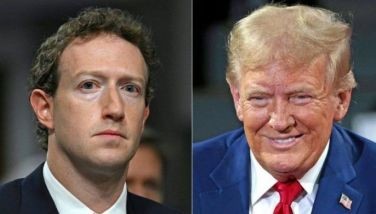The Chinese belief in feng shui has become so widespread that a lot of people now practice it. Even famous Hollywood celebrities and world leaders are said to adopt feng shui practices, believing in lucky numbers and incorporating them in everyday decisions. Feng shui takes into account the lay-out of houses, the placement of furniture and even auspicious dates which are said to bring harmony, joy, health, prosperity and all the other good things in life. The key to all these, believers say, is to reflect the balance of nature in everyday life, explained in concepts like yin and yang, qi and the five elements of earth, water, fire, wood and metal.
There is a special significance why the Chinese have opted to open the Beijing Olympic Games on Aug. 8, 2008 – which is really 8-8-8, considered to be lucky for several reasons but mainly because in Cantonese, the pronunciation of the number “8” is similar to “make money.” Tomorrow will be China’s big debut on the world stage, its “coming out party” as the attention of the whole world will be riveted to the opening of the Olympic Games with its optimistic theme of “One World, One Dream” as more than 10,000 athletes from over 300 countries compete in 28 sports. More than 80 of the world leaders will attend, except for a few holdouts due to human rights issues against the Chinese. Foremost of the leaders is George Bush and his friend GMA who will be attending the ceremonies. I assume quite a number of our honorable Congressmen will also attend this big event.
Over half a million tourists are expected to flock to China for this event that is considerably one of the most anticipated in the world. Despite bombing threats and protests that have marred it, Chinese officials are pulling out all stops to enhance the image of their country before the world and showcase their progress and technical prowess.
Since China started opening up in 1978, its economy has grown by leaps and bounds, transforming itself into a political superpower and a giant economy. China’s GDP growth at more than nine percent in recent years has resulted in the increased number of its middle class from 65.5 million in 2005 to 80 million in January last year, earlier predicted to expand to 700 million by 2020. China’s economic boom captured global attention, with investors pouring in their resources into the provinces. Malls and factories began rising like mushrooms, and real estate prices particularly in the Southern part of China saw an upsurge.
Beneath the boom and the dazzling growth however lies a dark cloud in the Chinese horizon with poverty stalking many parts of the country. Approximately 300 million Chinese still live in abject poverty particularly in places like Henan where people are so poor they do not even have access to basic services like clean water. China has the second largest world population with 1.3 billion people, representing about 20 percent of the world’s population. Though China’s population growth had slowed down with the one-child policy since 1979, a lot of Chinese have found ways to go around it, with the wealthy buying property outside and having children in their “adoptive” countries like the Philippines. (The problem however is if they keep their families here, they add to our population.) Sensing the growing resentment of the people over this policy, a special provision has been made allowing couples who are both without siblings to have two children of their own.
A big worry now is the economic slowdown that seems to be taking hold of China, with factories experiencing a sharp drop in new orders and exports at a virtual standstill. Real estate prices are also taking a plunge, with residential areas in the center of Shenzhen recording a drop of 10 percent over the last year while nearby areas posted a sharp decline of up to 40 percent. On the other hand, the slowdown in China’s growth is being attributed to the drop in gasoline prices in the US, as well as the sharp decline in the prices of copper, tin, aluminum and zinc with China cutting back on the consumption of these metals. Consequently, cut-downs on employment are also anticipated, with companies hard put to keep their factories open. Chinese government officials though are moving quickly to manage the effects of a slower economy, putting on a series of breaks in the last five years to keep inflation under manageable levels.
No doubt the Philippines will be affected by the slowdown since the volume of trade between the two countries has been increasing, surging to a record high of $30.6 billion in 2007 – a tenfold increase from the $3.14 billion in 2000. Chinese exports consist of consumer electronics, clothing, textiles and light industrial products among others while Philippine exports are mainly electronic products including semi-conductor devices, with the balance of trade reportedly in favor of the Philippines.
While officials say the economic downturn has nothing to do with the Olympics, many believe otherwise. A lot of factories have been forced to cut down on their operating hours due to scattered power shortages in half of China’s provinces because of the short supply of coal for the new power plants built just over two years ago. Most likely this has to do with China’s attempt to rectify its image as a major “polluter” as the Summer Olympics draws near.
We’ve been lucky that the air quality in the Philippines has significantly improved since the lessening of the Chinese export of “polluted air” when China closed down a number of its factories, aside from the fact that the rains have driven away a lot of the pollution. Hopefully the Chinese feng shui of cleaner air will continue even beyond the Olympic Games.
* * *
Email: [email protected]

































